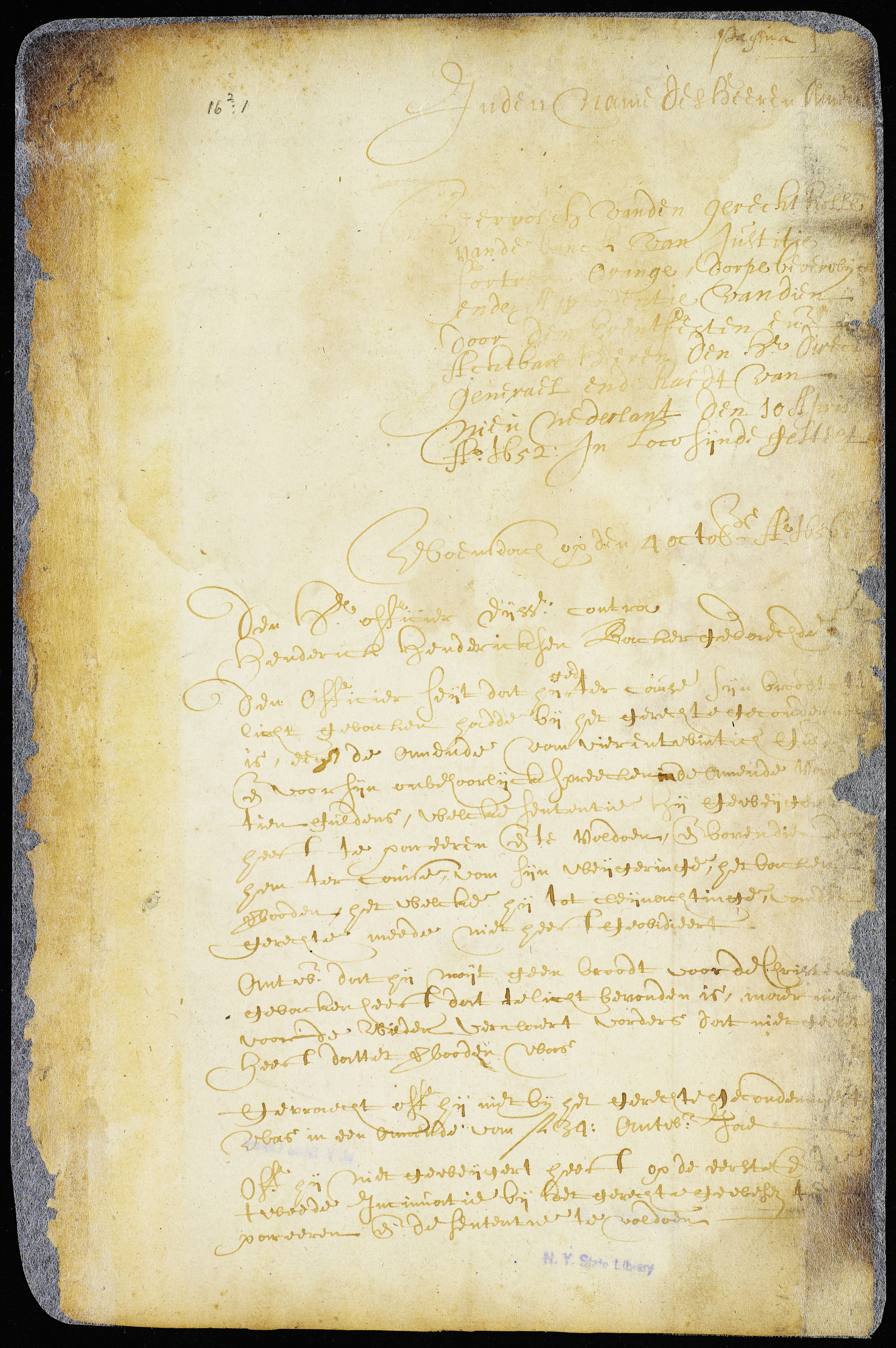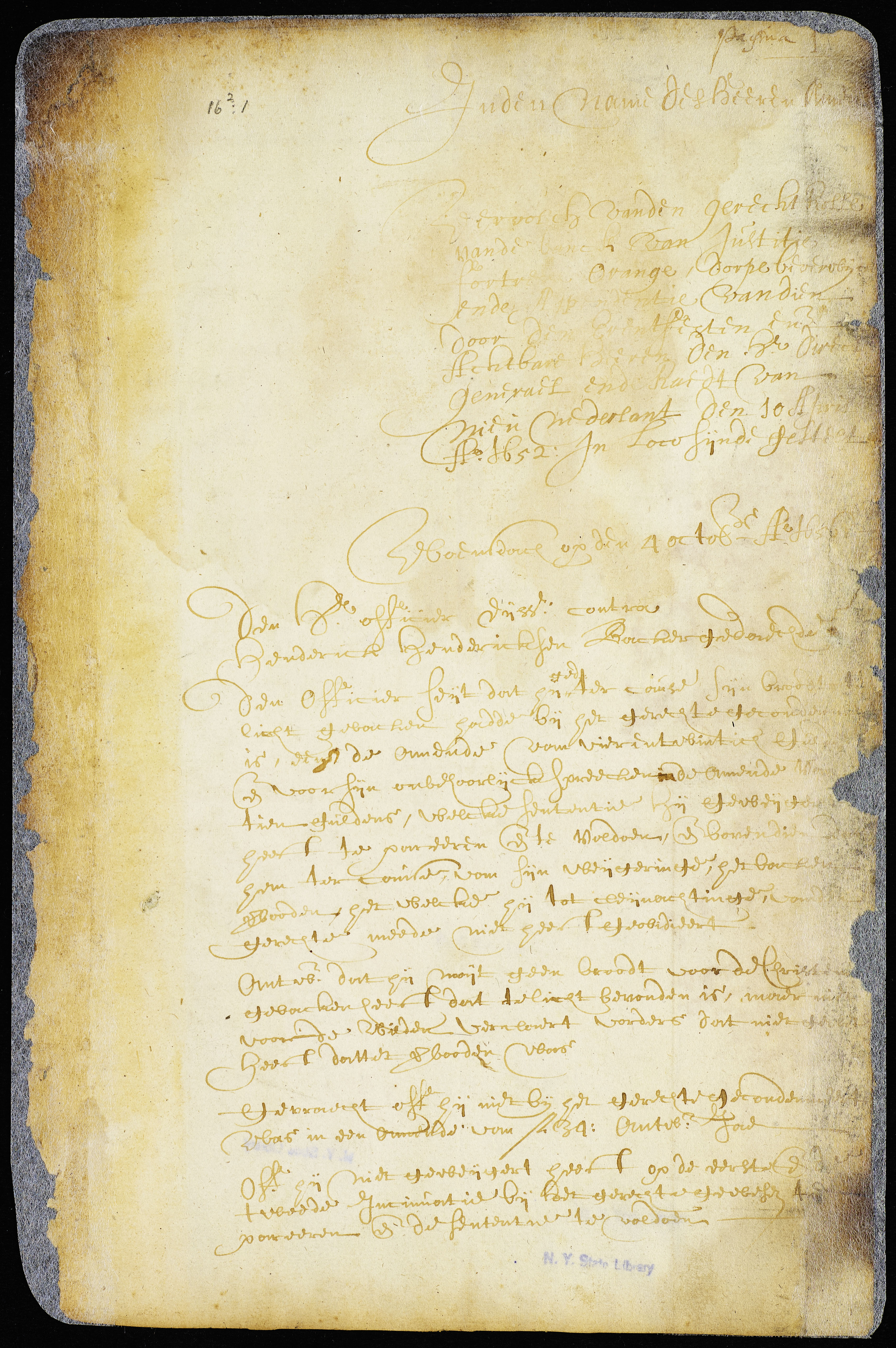[ 33 ] Ordinary Session Held in Fort OrangeJanuary 9, 1657[1]
President, J. La MontagneRutger JacobsenAnderies HerbertsenJacob SchermerhoomPhilip Pietersenmagistrates
Lambert van Valckenborch, plaintiff, against Henderick Claessen and Gerrit Willemsen, defendants.The plaintiff complains that the defendants beat him and his wife in his own house.The defendants deny it and claim that the plaintiff chased them with a drawn sword out of his house and pursued them to the center of the fort.The court orders the parties respectively to prove their assertions.
Jacob Janssen Schermerhoom, plaintiff, against Reyer Albertsen, defendant.The plaintiff says that the defendant sicked his dog on his goats and killed one of them.The defendant denies having done so.The plaintiff produces as a witness Andries de Vos, who declares that he saw it.The court condemns the defendant to pay the plaintiff twelve guilders for the goat which was killed.
Foppe Barensen, plaintiff, against the officer and Willem Brouwer, defendants.The plaintiff complains that the officer took him into custody without cause.The officer maintains that he took the defendant into custody on the complaint of Willem Brouwer, who claimed that the defendant had committed violence in his own house.Willem Brouwer maintains that the complaint is true.The plaintiff replies that he has committed no violence in the defendant’s house, but that on the contrary, Willem Brouwer forcibly drove him out of the house with a broomstick, because he demanded payment for a pair of boots which he had sold to him, or to take measurements in order to make a pair of new ones.The court orders the plaintiff and Willem Brouwer, the defendant, to prove their statements.
Foppe Barensen, plaintiff, against Comelis Vos, defendant.The parties having been heard several times, it is ordered by the court that each shall choose an arbitrator to settle their dispute in an amicable manner.Immediately, the plaintiff chose for himself Stoffel Janssen and the defendant Anderies de Vos, to whom the court added Rutger Jacobsen, as mediator, to decide the question at issue to the best of their knowledge.
Lowies Cobussen, as attorney for Jan Peeck, plaintiff, against Frans Barensen Pastoor, defendant.The plaintiff says that he caused ten beavers in the hands of the defendant to be attached, which the defendant in spite of the attachment paid to Pieter Bronck.The defendant maintains that he paid the said beavers by order of the court.Pieter Bronck, appearing before the court, acknowledges that he received the beavers in payment of a debt due by Johannes Dijckman.The court orders the wife of Johannes Dijckman to pay the sum of eighty-four guilders to Jan Peeck, which she did immediately by bill of exchange through Commissary Johannes La Montagne.
Frans Barensen, plaintiff, against Marcelis Janssen, defendant.The plaintiff demands of the defendant an accounting of the farming of the tapsters’ excise, in which he was a partner.The court, having heard the parties, orders the defendant to render an accounting to the plaintiff before two arbitrators to be chosen by them respectively, which arbitrators were chosen by the parties at once, to wit, Hendrick Jochimsen and Willem Bout, who are hereby authorized to examine the account of the plaintiff and to settle the difference to the best of their ability.
Rutger Jacobsen, plaintiff, against Claes Teunissen, defendant.The plaintiff demands delivery of the defendant’s house, sold to him by the defendant, in payment of a certain sum due to him by Jacob Luyersen, deceased.[2] The defendant acknowledges that he is ready to do so.The officer of the court, as protector of the rights of orphans, objects to the delivery and requests that curators be appointed to preserve the rights of the surviving children of Jacob Luyersen, deceased.The court appoints Jan Verbeeck and Evert Wendel curators to the aforesaid children.
The magistrates of this court, plaintiffs, against Henderick de Backer, defendant.Default. The defendant failing to appear, default is entered against him.
Pieter Meessen requests a lot for a garden.The court, after inspection of the lot, will accommodate the petitioner according to the situation of the place.
Tuenis Comelissen requests permission to build another house on his lot.The court will take the matter under advisement.
Claes Hendericksen, plaintiff, against Gerrit Slechtenhorst, defendant.The plaintiff says that the defendant has forbidden him to build on his own ground, to which the defendant replies that the ground on which the plaintiff is building belongs to him as lessee, maintaining that no one can build thereon without his consent during the term of his lease.
The plaintiff shows a lease in the defendant’s handwriting, in the margin of which is written that the plaintiff is to have the use of the yard at present in controversy.The defendant claims that such use was granted to the plaintiff only for the purpose of stacking his wood there and for bleaching, which he offers to prove.
Whereupon the defendant, on the 12th of December, produced before the court Jan Dereth, as a witness, who testified that he was present when the copy of the lease between the parties was changed or added to and that he heard the defendant simply grant the use of the yard in question to the plaintiff, but that he did not hear anything about consent to build thereon.The court, having several times heard the parties in their dispute and examined the lease made between them and the additions thereto, decrees that the defendant, Gerrit Slechtenhorst, is to have the use of the yard now in controversy without molestation, according to the lease; consequently, that the plaintiff cannot build thereon to the prejudice of the defendant without his consent. It is also ordered that the plaintiff, Claes Hendericksen, according to the lease and the additions thereto, shall have the use of the kitchen as a dwelling for himself or others who acquire his right, and that of the yard to stack wood and for bleaching.




